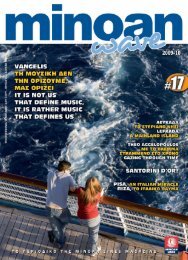You also want an ePaper? Increase the reach of your titles
YUMPU automatically turns print PDFs into web optimized ePapers that Google loves.
<strong>Contents</strong><br />
3 Cruise Olympia launched<br />
4 The XIII Euromed<br />
Convention focuses<br />
on green economics<br />
6 A new German call<br />
for Finnlines<br />
7 New areas in<br />
Lagos terminal<br />
Monrovia calls resumed<br />
Top guests on board<br />
the Grande Angola<br />
8 Special awards<br />
to the Group<br />
9 News<br />
10 Agent List<br />
11 Schedules<br />
- Mediterranean Short Sea Network<br />
- Finnlines (Baltic & North Sea)<br />
- Atlantic Network<br />
- ACL<br />
- Euro Med Network<br />
Gr imaldi<br />
NE WS<br />
Direttore Responsabile / Editor in Chief<br />
Luciano Bosso<br />
Progetto grafico /Graphic design<br />
Marco Di Lorenzo<br />
Pubblicazione trimestrale<br />
Quarterly publication<br />
Reg. Trib. Napoli n. 5150 del 26/9/2000<br />
Stampa / Print: ROSSI srl - Nola (Napoli)<br />
Circulation 38,000 copies<br />
Printed on 7 January 2010<br />
GRIMALDI GROUP<br />
Via Marchese Campodisola, 13<br />
GNE WS80133<br />
NAPOLI (Italy)<br />
Grimaldi News can be seen on<br />
line on www.grimaldi.napoli.it<br />
Editorial<br />
“Darwinian” economics<br />
The economic crisis has different readings, but History, as most often happens,<br />
can teach us a lot.<br />
2009 could have coincided with the crisis’ highest point and, therefore, with the<br />
predictable path towards recovery. These difficulties have taught us that nothing will<br />
be the same again, namely that the current production system will not be able to<br />
ensure our survival. There is a need for a change of gear through innovation.<br />
2009 has coincided with the bicentenary of Charles Darwin’s birth, father of the<br />
theory of natural selection of species. Just a year after his death the economist<br />
Joseph Schumpeter was born, who is considered the natural successor, in an economic<br />
perspective, of Darwin’s theory.<br />
Schumpeter asserted the idea that economic development depends mainly on the<br />
technological innovations introduced by a small group of businessmen and also<br />
that these innovations are possible if they are accompanied by the creation of bank<br />
credit and stimulated by a profit expectation.<br />
This idea is followed by the theory of “creative destruction” as an engine of economic<br />
development. Schumpeter and Darwin are on the same line: in nature the<br />
strongest survives, but this strength is not intended as physical, but as intelligence,<br />
innovation and sometimes even luck.<br />
These theories have had several feedbacks in many economic fields and can offer<br />
a clear indication to understand both difficulties and opportunities to revitalize the<br />
maritime sector.<br />
What the market demands is the shipowner’s positive and innovative activity and his<br />
ability to sense the changing needs of consumers. According to Schumpeter the<br />
alternation of expanding and recessive phases are part of the market nature. The<br />
businessman, with his new products, has to raise the economy.<br />
Today Schumpeter would say we are in a “creative destruction” phase, in a state<br />
of crisis in which old firms which do not renew themselves die and new realities<br />
emerge. The question we must ask ourselves is: “Are we the protagonists of this<br />
change?”. In the case of Grimaldi the answer is yes. The Group’s philosophy has<br />
always been increasingly innovative in the pursuit of success. If today the market<br />
requires younger, modern, efficient and environmentally friendly vessels, then our<br />
Group is strong according to Darwin’s theory and is ready to respond to its customers’<br />
requests.<br />
These topics have been widely discussed at the recent XIII Euromed Convention<br />
held in Cagliari, whose theme was “Environmental and economic sustainable mobility”.<br />
The Group’s largely implemented investment plan was reflected, inter alia, in<br />
the construction of four modern cruise ferries, the last of which, the Cruise Olympia,<br />
was recently launched, and will be in service mid of 2010. These modern units are<br />
highly environmentally friendly because they combine speed, comfort and high<br />
performance with a very low fuel consumption. Which today is what both nature<br />
and the market demand. These vessels are the result of an important research<br />
programme. Furthermore, from the beginning of 2010 two revolutionary ro/ro units,<br />
now under construction in Korea, will be deployed. They are revolutionary because<br />
they will significantly cut CO² emissions: about 750 kg per trailer while back in 1980<br />
the emissions were 2,500 kg per trailer, a reduction in thirty years of over 70%. The<br />
question of economic efficiency should marry the ethical value of the environment’s<br />
preservation and this has always been understood by our group.<br />
The Grimaldi fleet is, therefore, the model required by the market, with its innovative<br />
and technologically advanced vessels. But the Group cannot do everything alone;<br />
we need a strong contribution from everyone, especially from National Governments<br />
and the European Commission, to force the scrapping of vessels older than<br />
thirty years, thus resulting in a fleet rejuvenation. In this case, shipyards would<br />
receive new contracts that would have positive effects on employment while the<br />
whole community would also benefit from a reduction of harmful emissions through<br />
the use of more environmentally friendly ships.






